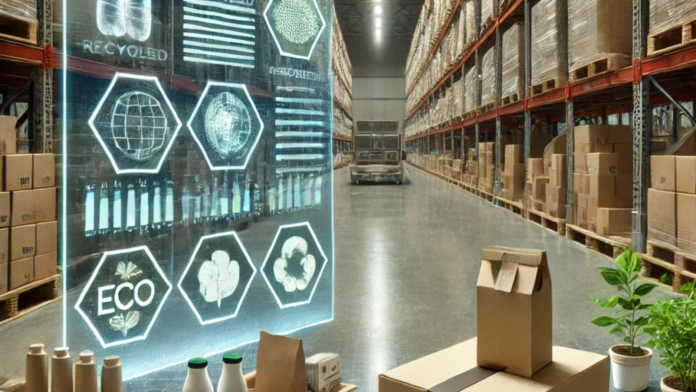In recent years, sustainability has evolved from being a niche concern to becoming a business imperative across industries. One area where sustainability has gained significant traction is packaging. Companies are now rethinking their packaging strategies, moving away from traditional materials that are environmentally harmful and embracing sustainable packaging solutions. This shift not only addresses environmental concerns but also offers substantial business benefits. In this article, we’ll explore the key advantages of adopting sustainable packaging for businesses and why it’s an essential strategy for long-term success.
1. Cost Efficiency and Resource Optimization
One of the most compelling business benefits of sustainable packaging is cost efficiency. Sustainable packaging often involves reducing the amount of material used, optimizing packaging design, and using recycled or renewable materials. By switching to eco-friendly packaging solutions, businesses can reduce material costs and waste disposal fees.
For example, “right-sizing” packaging—designing it to use the minimum amount of material necessary for protection—lowers material use and shipping costs by reducing package size and weight. Additionally, using lighter materials or reusable packaging can lead to significant savings on transportation, as smaller or lighter packages consume less fuel during transit.
Moreover, companies that invest in closed-loop systems—where packaging is collected, reused, or recycled—can reduce the costs associated with sourcing raw materials. This not only cuts costs but also reduces dependency on volatile raw material markets.
2. Enhanced Brand Image and Consumer Loyalty
Consumers are becoming increasingly eco-conscious, and their purchasing decisions are influenced by a brand’s environmental stance. Sustainable packaging provides businesses with an opportunity to strengthen their brand image and connect with this growing segment of consumers. According to a study by Nielsen, 66% of global consumers are willing to pay more for sustainable products, and packaging plays a key role in that decision.
By adopting sustainable packaging, companies can differentiate themselves in a crowded market. Brands that demonstrate a commitment to reducing their environmental footprint are more likely to earn consumer trust and loyalty. Eco-conscious customers are also more likely to become repeat buyers and advocates for the brand, further boosting customer retention.
3. Regulatory Compliance and Risk Reduction
Governments around the world are introducing stricter regulations to curb plastic waste and encourage sustainable practices. From plastic bans to extended producer responsibility (EPR) programs, businesses are facing increased pressure to reduce the environmental impact of their packaging. By transitioning to sustainable packaging solutions, companies can stay ahead of regulations and avoid potential fines, restrictions, or penalties.
Moreover, adopting sustainable packaging reduces the risk of supply chain disruptions. As governments phase out harmful materials such as single-use plastics, companies that rely on traditional packaging materials may find themselves scrambling for alternatives. Businesses that have already adopted sustainable packaging will be better positioned to navigate these regulatory changes and maintain business continuity.
4. Improved Supply Chain Efficiency
Sustainable packaging often leads to more efficient supply chains. Lightweight, durable, and flexible packaging options reduce the physical volume of goods, allowing for more efficient use of storage and transportation space. This translates to lower fuel consumption, reduced shipping costs, and fewer resources required to store and transport goods.
Incorporating sustainable packaging also enhances the circularity of the supply chain. Reusable and recyclable packaging materials can be reintroduced into the supply chain, reducing the need for new materials and lowering the overall environmental impact of the production process. Companies that integrate closed-loop systems into their operations benefit from reduced raw material procurement costs and streamlined logistics.
5. Increased Customer Engagement and Marketing Opportunities
Sustainable packaging opens new marketing avenues for businesses. Packaging is often the first interaction consumers have with a product, making it a powerful tool to communicate a brand’s values. Companies can use sustainable packaging as a way to educate customers about their environmental efforts, creating stronger emotional connections with consumers.
Moreover, packaging that incorporates unique sustainable materials or innovative designs can capture consumer attention and create memorable experiences. Brands that use biodegradable, compostable, or reusable packaging can include clear messaging or QR codes that inform customers on how to dispose of or reuse the packaging responsibly. This fosters a sense of involvement and commitment among consumers, driving higher engagement.
6. Waste Reduction and Environmental Impact
Perhaps the most obvious benefit of sustainable packaging is its positive environmental impact. Traditional packaging materials such as plastic contribute significantly to landfill waste and ocean pollution. By switching to eco-friendly alternatives—such as recycled paper, bioplastics, or compostable materials—businesses can dramatically reduce the waste they generate.
Sustainable packaging also minimizes carbon emissions during production and transportation. For example, recycled materials often require less energy to produce than virgin materials, and lighter packaging reduces fuel consumption during shipping. Additionally, materials like cardboard, paper, or plant-based plastics are more likely to break down naturally, reducing the long-term environmental impact.
Companies that reduce their environmental footprint through sustainable packaging also have the opportunity to improve their sustainability metrics, which can be reported in corporate social responsibility (CSR) or sustainability reports. This not only boosts a company’s reputation but can also attract eco-conscious investors who prioritize environmental, social, and governance (ESG) factors.
7. Innovation and Competitive Advantage
Adopting sustainable packaging solutions drives innovation. As businesses seek more eco-friendly alternatives, they must often rethink their entire packaging process. This fosters a culture of innovation, as companies explore new materials, designs, and supply chain processes to meet sustainability goals.
Being an early adopter of sustainable packaging can also give companies a competitive edge. As consumers, investors, and regulators increasingly prioritize sustainability, businesses that lead the way in eco-friendly packaging are better positioned to capture market share and stay ahead of competitors who lag in this area.
8. Long-Term Business Sustainability
Sustainable packaging is not only about addressing immediate environmental concerns but also about ensuring long-term business sustainability. As resources become scarcer and environmental regulations tighten, businesses that fail to adopt sustainable practices may face higher costs, supply chain disruptions, and loss of market share. Companies that invest in sustainable packaging today will be better prepared to adapt to these changes and continue to thrive in the future.
Sustainable packaging aligns with the principles of a circular economy, where resources are kept in use for as long as possible, waste is minimized, and products are designed for reuse or recycling. This shift is essential for businesses looking to build resilient and future-proof supply chains that can withstand environmental, economic, and regulatory changes.
Conclusion
Sustainable packaging is no longer just a trend—it’s a business necessity. From cost savings and supply chain efficiency to enhanced brand image and regulatory compliance, the benefits of sustainable packaging extend far beyond environmental impact. By adopting eco-friendly packaging solutions, businesses can not only reduce their carbon footprint but also unlock new opportunities for growth, innovation, and customer loyalty. As the demand for sustainable practices continues to rise, companies that embrace sustainable packaging will position themselves as leaders in a rapidly evolving marketplace.
—
This article highlights the advantages of sustainable packaging for businesses. Let me know if you would like to explore any specific examples or sectors in further detail!















